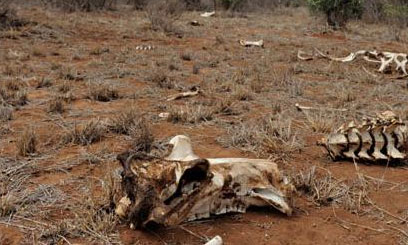 NAIROBI, Kenya, Jul 16 – Prime Minister Raila Odinga on Sunday morning held talks with visiting British Minister for International Development Andrew Mitchell on the refugee crisis in northern Kenya and the food and drought situation in the Horn of Africa.
NAIROBI, Kenya, Jul 16 – Prime Minister Raila Odinga on Sunday morning held talks with visiting British Minister for International Development Andrew Mitchell on the refugee crisis in northern Kenya and the food and drought situation in the Horn of Africa.During the talks, attended also by British High Commissioner to Kenya Rob Mcaire, the PM renewed calls to the international community to engage more meaningfully in addressing the crisis in northern Kenya.
The premier said: “For instance we would like the establishment of feeding programs on the Somali side of the border to ensure that those lacking food do not have to cross into Kenya to get it.”
Mr Odinga said the Somalis currently crossing into Kenya are running away from hunger, not insecurity and starting a feeding programme in their country would make a big difference.
On his part, Mitchell who visited Raila at his home in Karen echoed the premier’s calls to the international community to support Kenya to deal with the refugee crisis.
Backing Kenya’s effort he said would be an appreciation of its act of kindness for the measures it has taken including agreeing to open the IFO II camp in Daadab.
Western countries and other donors have pledged millions of dollars in aid for the drought victims but Mr Odinga said more still needed to be done.
Britain promised 52 million pounds (59 million euro, 73 million dollars) in emergency aid, in a statement Saturday from Mr Mitchell.
“The situation is getting worse and is particularly devastating in Somalia, where families already have to cope with living in one of the most insecure countries in the world,” he said.
He called for doing “more to help not only refugees but also those victims of the drought who remain in Somalia.”
UNICEF said last week it needed 31.8 million dollars for the coming three months to assist millions of affected women and children.
It estimates that more than two million children in the region are malnourished and need urgent help, while some 500,000 of them face imminent, life-threatening conditions.
Experts have called for long-term measures to deal with the effects of recurring drought, arguing that the resultant human suffering can be avoided.
“Although governments and their development partners cannot make the rains come, they can mitigate the impact of these recurring droughts in East Africa,” Kevin Cleaver of the International Fund for Agricultural Development said this week.
He argued that governments and donors should invest more in agricultural research to develop drought resistant crops and fodder for livestock.
The regions in the Horn of Africa often affected by cyclical drought have also been neglected by governments, with no electricity, roads, water and other basic health and education facilities.
These arid regions, many of them far removed from capitals, have also seen frequent inter-clan clashes over scarce resources as well insurgencies.
No comments:
Post a Comment